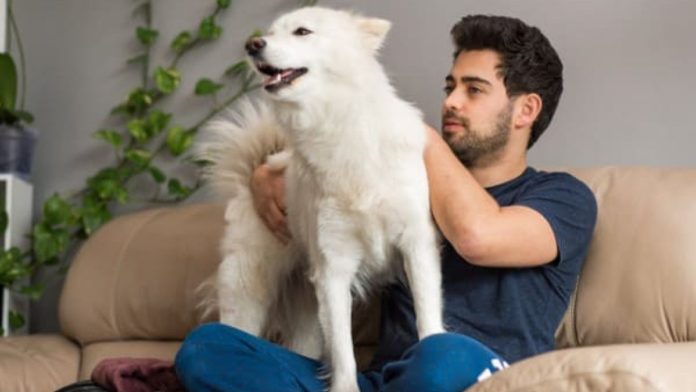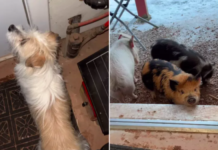Last Updated on January 16, 2024 by Fumipets
Why Does My Dog Stand On Me? Find Out!
Have you ever found yourself wondering why your furry companion insists on standing on you, whether it’s while you’re sitting on the couch, lying in bed, or simply relaxing on the floor? Many dog owners have experienced this peculiar behavior and have been left pondering the reasons behind it.
In this article, we’ll delve into the intriguing world of canine behavior to answer the question, “Why does my dog stand on me?” We’ll explore the possible motivations behind this action and provide insights to help you better understand your four-legged friend.
My Dog Stand On Me
Every dog owner is aware that their four-legged buddy sometimes displays peculiar behaviour. Most of these eccentricities are adorable and harmless. When our dogs chase their tails until they get unsteady and tumble over, we laugh. We record them moving when they sleep or licking the last of the peanut butter from the jar. As dog owners, we have a regimen that includes nightly zoomies. Unexpected chew toys are discovered beneath the sofa and half-eaten snacks are discovered in our laundry.
Even if our dogs’ eccentricity adds to their attractiveness, there are moments when we have to wonder why they act in certain ways. Why does my dog stand on me is a common query among dog owners. Maybe your 80-pound Labrador Retriever treats you like a lap dog and has to stand on you whenever you take a seat. This may sound familiar to you.
All breeds of dogs often stand on their owners. Your dog may behave in this way for a variety of reasons, including personality, training, and health. Let’s examine the most frequent causes of dogs standing on people and talk about when this can be cause for alarm.
The 7 Reasons for The Behavior
1. They Want Attention
The need for attention is among the most frequent causes of our dogs’ love of standing on us. Canines are sociable creatures. They develop strong attachments to their human companions. Our pets miss us when we are away all day or spend too much time on our computers.
Your dog may sometimes make an effort to interact by sharing a toy or barking. Other times, they approach you directly by sitting down on your lap and standing right on top of you. If you’ve ever had this happen to you, you know it often comes with a direct glance into your eyes. Your dog is trying to tell you that you’ve already accomplished enough for the day and that it’s time to focus on them.
2. They Love You
Your dog could jump on top of you while you’re sitting on the sofa, even if you spend a lot of time playing with them and giving them plenty of love. This is often how they show that they care. Dogs like expressing their devotion to their owners. One method to accomplish it is to approach.
Your dog can need your love as well. They can be trying to get you to touch them or scratch their ears by standing directly on top of you. They could leap down or settle down for a lengthy cuddling session on your lap if you give them a few pets.

3. They’re Sick
Our pets can hear us speak, but they cannot reciprocate. The only means through which your dog may communicate with you when it is ill is via body language and behavior. As a pet owner, you are familiar with your pet’s personality. If your dog, who is often active and vivacious, becomes withdrawn and clinging, this may be a sign that something isn’t quite right in their world.
Your dog may exhibit a number of symptoms that indicate illness, including limping, shaking, panting, excessive licking, or changes in appetite. Call your veterinarian if your dog exhibits any of these signs together with a greater desire to be close to you.
4. Something Is Wrong
Dogs have the ability to detect when anything is off or unusual in their human owners, however we aren’t precisely sure how they do it. They could detect a difference in your body odor or any other alteration.
Your dog will try to defend you if they sense something strange. One method of doing this is by standing on you. Make an appointment with your doctor if you have been feeling under the weather and your dog is becoming more clinging than normal.
5. Learned Behavior
If your dog has previously gotten attention and hugs by standing on you, they are probably going to do it again. Dogs are intelligent creatures that can recall rewards for certain actions. Your dog will repeat the behavior if they seek the same outcome since doing so in the past resulted in love.

6. They’re Feeling Anxious
Your dog may be nervous about something even if they are not unwell. Perhaps a storm is approaching, or they feel uneasy because they are in a strange setting. Some dogs are frightened of unfamiliar people or loud sounds. This anxiety could make someone want to be near you.
A dog that is terrified or worried might be comforted by your proximity and love. One indication that your dog is experiencing anxiety and is hovering is when they tuck their tail between their legs. You should speak with your vet about these behaviors if your pet is prone to nervousness in unfamiliar environments or is quickly alarmed. They may provide advice on how to help your dog face their concerns.
7. Asserting Dominance
You should see your vet right away if your dog is standing on you and acting aggressively, such as snarling or snapping. They may suggest hiring a dog trainer and taking other steps to prevent aggressive behavior from becoming a problem. Future problems may result if this conduct is not stopped. It is crucial to seek professional assistance since sudden, atypical violence may also be a symptom of a deeper problem, such as disease or anxiety.
Possible Solutions
Most of the time, it’s not a problem when your dog stands on you. There are actions you may do to minimize the habit, however, if it does start to become a problem.
To ease their anxiousness, keep a regimen and feeding schedule. Keep an eye out for modifications in your dog’s attitude and behavior, and see your veterinarian if you detect anything out of the ordinary.
Finally, make sure your dog receives the daily exercise and care they need. Give your dog plenty of hugs and attention if they long for human contact. The greatest present that our dogs can provide is love, after all.
Questions & Answers: Why Does My Dog Stand On Me?
Why does my dog stand on me when I’m sitting or lying down?
Dogs often stand on their owners for a variety of reasons. One common explanation is that your dog seeks attention or affection. When they stand on you, it’s a way of getting closer to your face and engaging with you. It’s also possible that your warmth and scent provide comfort to your dog.
Is there a dominance aspect to my dog standing on me?
In some cases, yes. Standing or leaning on you can be a way for dogs to assert their dominance or claim you as part of their pack. However, it’s important to consider other factors and body language to determine if dominance is the primary motivation.
Does age or breed influence this behavior?
Yes, age and breed can play a role. Puppies often stand on their owners more frequently as they seek attention and explore their world. Certain breeds, like herding dogs, may be more inclined to exhibit this behavior due to their natural instincts to herd or protect.
How can I discourage my dog from standing on me if it bothers me?
You can train your dog to avoid standing on you by using gentle, positive reinforcement techniques. Reward them when they exhibit desired behaviors, such as sitting or lying down beside you, rather than on top of you. Consistency and patience are key.
When should I be concerned about my dog’s behavior?
While standing on you is often harmless, be alert to changes in behavior or signs of discomfort or pain. If your dog suddenly starts standing on you excessively or exhibits other unusual behaviors, it’s a good idea to consult with a veterinarian to rule out any underlying health issues.


















